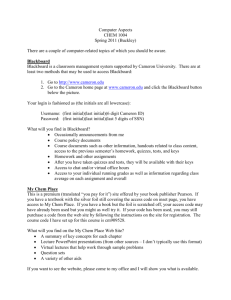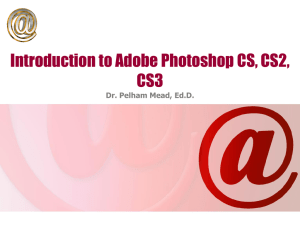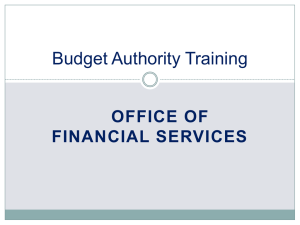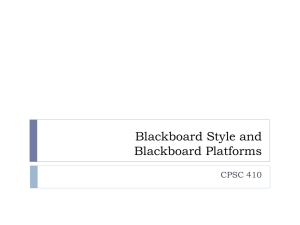Syllabus - Cameron University
advertisement
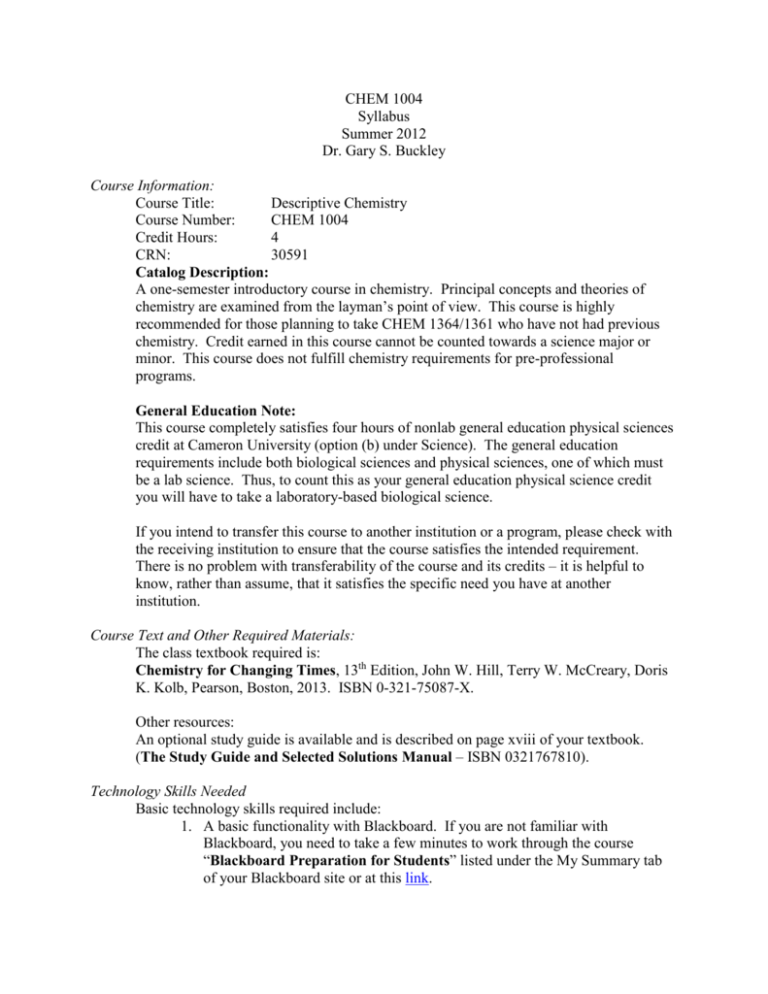
CHEM 1004 Syllabus Summer 2012 Dr. Gary S. Buckley Course Information: Course Title: Descriptive Chemistry Course Number: CHEM 1004 Credit Hours: 4 CRN: 30591 Catalog Description: A one-semester introductory course in chemistry. Principal concepts and theories of chemistry are examined from the layman’s point of view. This course is highly recommended for those planning to take CHEM 1364/1361 who have not had previous chemistry. Credit earned in this course cannot be counted towards a science major or minor. This course does not fulfill chemistry requirements for pre-professional programs. General Education Note: This course completely satisfies four hours of nonlab general education physical sciences credit at Cameron University (option (b) under Science). The general education requirements include both biological sciences and physical sciences, one of which must be a lab science. Thus, to count this as your general education physical science credit you will have to take a laboratory-based biological science. If you intend to transfer this course to another institution or a program, please check with the receiving institution to ensure that the course satisfies the intended requirement. There is no problem with transferability of the course and its credits – it is helpful to know, rather than assume, that it satisfies the specific need you have at another institution. Course Text and Other Required Materials: The class textbook required is: Chemistry for Changing Times, 13th Edition, John W. Hill, Terry W. McCreary, Doris K. Kolb, Pearson, Boston, 2013. ISBN 0-321-75087-X. Other resources: An optional study guide is available and is described on page xviii of your textbook. (The Study Guide and Selected Solutions Manual – ISBN 0321767810). Technology Skills Needed Basic technology skills required include: 1. A basic functionality with Blackboard. If you are not familiar with Blackboard, you need to take a few minutes to work through the course “Blackboard Preparation for Students” listed under the My Summary tab of your Blackboard site or at this link. 2. Basic ability to browse the internet using preferably Mozilla Firefox or Google Chrome. Though Internet Explorer 6 and above is supported, Firefox and Google seem to be more stable, particularly in the quizzing and testtaking activities. If you do not have Firefox, it is a free download available at http://www.mozilla.com. 3. Ability to perform basic word processing functions in Microsoft Word or other word processor. This is necessary for the two writing assignments. Technology Support If you have any trouble with technical aspects of Blackboard, login to Blackboard and go to the Cameron Links menu option in the upper-left hand corner of the Blackboard screen and choose the Technical Support option. Cameron’s Distance Learning office may be contacted at 580-581-5498 and is located in South Shepler 419 on the Cameron University campus. The director’s name is Lisa Restivo. Grading System Graded components of the course include the following with the indicated weightings. Notice the two Methods. One includes the Self-Assessments at 10% and the other does not include those but shifts that weight to the mid-term/final category. You will receive the higher of those two percentages – there is no need for you to make a deliberate decision about which Method will be applied. Component Self-Assessments Participation in Discussion Forums Periodic Table and Case Study Six Quizzes Two tests – midterm and final Weight in Method 1 10% 10% 15% 20% 45% Weight in Method 2 0% 10% 15% 20% 55% Description of Graded Components Self-Assessments (10% in Method 1 or 0% in Method 2) – The material in the course is divided into smaller units. Each unit is accompanied by a self-assessment. These help you check your understanding and also give me information on class progress. The grading system is designed to make these optional. Your grade will be computed two ways – the self-assessments will comprise 10% of your grade or that 10% will be shifted to the midterm and final. The choice will be based on whichever gives you the higher grade. My suggestion is that you work the Self-Assessments for practice, particularly if you have never had chemistry before. Participation in Discussion Forums (10%) – A part of your course grade will be your participation in Discussion Forums. There will be two types of forums – you do not need to contribute to both but some weekly contribution is expected in at least one of them. The two forums and their grading systems are: Content Forum – There are two ways you can earn credit in the Content Forum. Simply asking a content-related question will earn one point. Making a response to an asked question in a meaningful way will earn two points. I will follow the discussions in the Content Forum regularly and will occasionally attempt to help answer a question, but only after I see some effort on the part of classmates to help answer the question. Current Events Forum: This forum allows you to bring up events in the area of chemistry that are in the news as the course goes along. When you post a current event, also please post the date you saw the item and the source. If you are the first to bring up a topic you will get two points. If you add depth to the topic in the way of feedback, reasonable follow-up questions, other information you may have seen about the topic, etc. you will earn four points. Overall Forum Grading: The grading period for Discussion Forums will be from 12:01 am on each Thursday to 12:01 am the following Thursday. Each week I will go through and grade the forums using the process indicated above. There is a maximum of 10 points to be earned each week. You don’t have to stop contributing after that, but the most you can get for a week is 10 points. Overall, your percentage of points earned out of the 80 possible points is your Discussion Forum grade. Please note that grading of Discussion Forums will require some subjectivity on my part – I will be as consistent as I can in the evaluation and you will receive feedback. Short Papers – (15%) There will be two short papers assigned during the semester based on a given prompt. These papers will be submitted through the SafeAssign system that checks for plagiarism. Grading rubrics will be provided when these papers are assigned. Six Quizzes (20%) - There will be a quiz over the weekly material from Weeks 1, 2, 3, 5, 6 and 7. The first quiz is a syllabus quiz to make sure any kinks are worked out of the system. These quizzes will be administered through Blackboard under Assignments. You will have a 72-hour (3-day) window in which to take each quiz. More detailed information is available in the weekly and monthly calendar under Course Information. Two Tests (45% in Method 1 or 55% in Method 2) – There will be two major tests given – a midterm at the end of Week 5 and a Final Exam at the end of the semester. You will have a 120-hour (5 day) window in which to take these tests. The midterm must be proctored. Information on finding a proctored testing site may be found in the Announcements. Please note that proctoring arrangements must be completed by June 15th even though the first proctored exam is not until early July. More detailed information on the scheduling may be found in the monthly calendar under Course Information. Missed Quizzes and Tests – Because of the window of availability to take the tests, there are few reasons to miss a test. Examples might be proctoring site issues or technology issues. If these sorts of issues arise, please advise me as soon as possible so we can work on a solution. Interaction and Collaboration The bulk of the interaction in this course will occur through asynchronous means – i.e., there are not specific points in time in which you must be on the course. There are different avenues through which you may interact with each other or with me. Discussion Board: The discussion board may be accessed from the Blackboard menu. Once in Blackboard click on the Discussion Board link in the upper-left hand corner. As you have seen earlier in the policy, a portion of your grade depends upon you taking a meaningful role in the discussion area. This does not require you to be on at any particular time – the discussion board keeps track of the discussion and you can contribute whenever you want. e-mail: e-mail, of course, does not require participants to be online at the same time and is totally asynchronous. My e-mail address is gbuckley@cameron.edu. Virtual office hours: I will hold at least two “virtual office hours” a week. These are times when I will log into Blackboard and carry on back-and-forth conversations with whoever decides to take part. These are accessed through the Tools option on the menu followed by Blackboard Collaborate. If a session is active you will see it as a live link. If you are unable to attend but would like to know what went on, I will keep a recording of each session so you can view that at your leisure. Just click on the link for the virtual office hour whose transcript you want to see. If nobody logs into a session, I will erase it from the Collaborate window. There are options in Blackboard Collaborate to use video and audio but you are not required to have that capability to join the session and take part in the office hour. Other Information Cameron University Common Syllabus: The Cameron University Syllabus is available at http://www.cameron.edu/uploads/54/3d/543de57c86c0240ec5996243f5aa1827/Common _syllabus_Summer_2012_8Week.pdf Bookstore Information: Available under Cameron Links in the Course Menu Computer Lab and Library Information: Available under Cameron Links in the Course Menu Academic Integrity/Dishonesty: Each student is expected to engage in all academic pursuits in a manner that is above reproach. Students are expected to maintain complete honesty and integrity in the academic experiences both in and out of the classroom. Any student found guilty of academic dishonesty will be subject to disciplinary action. ADA Compliance: It is the policy of Cameron University to accommodate students with disabilities, pursuant to federal and state law. Students with disabilities who need classroom accommodations must make their requests by contacting the Office of Student Development at (580) 581-2209, North Shepler Room 314. Student Handbook: The Student Handbook which addresses many questions you may have may be accessed at: http://www.cameron.edu/studentservices/handbook/ Course/Instructor Complaints: If you have issues with my handling of this course please first raise them with me. If I do not respond adequately and you wish to further pursue your concern you may contact the chair of the Department of Physical Sciences, Dr. Danny McGuire, at dmcguire@cameron.edu or 580-581-2246. Withdrawal/Add/Drop and Refund Policy: Key dates to be aware of: May 31st: June 6th: July 12th : July 19th: July 26th: July 30th: Classes Begin Last day to enroll in an eight-week summer class Last day to drop an eight-week summer class without a “W” on the transcript and without being financially responsible Last day to drop a class with an automatic “W” Last day to drop a class Last day of class Grades posted by 4:00 pm.
